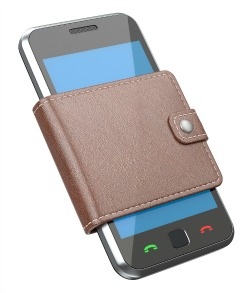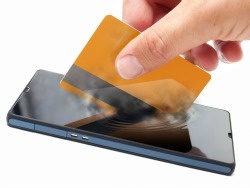Where Will Mobile Wallets Be One Year From Now?
 In short, mobile wallets will still be with us and will be a normal part of our daily life one year from now. Research indicates this new form of payment will become part of marketing programs across all channels and industries. An article published earlier this week, Where Will The Mobile Wallet Industry Be 1 Year From Now?, addressed this question for merchants considering making the shift to accepting mobile wallet payments. Once merchants embrace this new form of payment, consumers will surely follow, and it is up to issuing credit unions to convince their members to link their credit cards with their Apple Pay, PayPal, Google Wallet, or other mobile wallet accounts:
In short, mobile wallets will still be with us and will be a normal part of our daily life one year from now. Research indicates this new form of payment will become part of marketing programs across all channels and industries. An article published earlier this week, Where Will The Mobile Wallet Industry Be 1 Year From Now?, addressed this question for merchants considering making the shift to accepting mobile wallet payments. Once merchants embrace this new form of payment, consumers will surely follow, and it is up to issuing credit unions to convince their members to link their credit cards with their Apple Pay, PayPal, Google Wallet, or other mobile wallet accounts:
If you had told someone 5 years ago that anyone would be able to use their smartphone almost as a credit card, they probably would have said you were nuts. However, over the past year, companies have been creating apps that do just that. These “mobile wallets” as they are called allow for payment information to be stored securely on a smartphone and payments to be made when a user opens the app. These apps have quickly spread out and are being used by so many people. PayPal, Google Wallet, and Apple Pay are only three examples of these mobile wallets that make paying for items so much easier. Of course, the technology is fairly complex, but at its most basic level, NFC chips in the area communicate with the smartphone to store payment information and then transmit it. This technology is brand new and it is becoming so common that it must leave you wondering, what else is this technology capable of? What is the future? Where will we be a year from now?
According to the research, this past year nearly 14% of companies used mobile wallets to interact with their consumers or their customer base. It has been projected that this year, nearly 27% have decided that they will expand their marketing techniques to include the mobile wallet technology. In the next three years, the idea of the mobile wallet will more than likely become more than just an idea. It will become an international marketing platform, and more than just the big companies will introduce their own mobile wallet apps, giving consumers even more choices. As technology continues to take over the world, it is no surprise that the continuance of having the ability to pay for items using an app has become so appealing. As these types of apps continue to come into focus, companies have begun to realize that the more technological marketing they introduce, the more likely they are to reach their target audience. Even more of a revelation has come from those that have already introduced these apps. Google Wallet, PayPal, and Apple Pay have all realized that advertising via their mobile wallets is a lucrative business. It is suspected that those who advertise via these apps will pay a mint to reach their audience. So, in the next year, it appears that mobile wallet marketing and advertising will become a serious hit as the number grow beyond 27%.
How to Win In the Mobile Wallet Game
If you want to play in the big leagues you have to pay the price. However, the price is not always that bad. For merchants, the price is upgrading their systems. By upgrading your POS and giving yourself the ability to accept mobile wallet pay, you open yourself up to a new wave of electronic payment. By doing this you can increase your consumer base and include those who love you but are choosing to switch to this type of payment. This type of payment is becoming the forefront of retail and those who do not upgrade will be left behind and lose their businesses and slowly fade from popularity. Why not be ahead of the curve instead of behind?
Mobile Wallets are truly the future. They are introducing not only a new method of payment but also a new way for businesses and companies to advertise to their target audience and create new marketing techniques. Although there seems to be an idea of what the next year will hold that will only be the beginning of what mobile wallets will be able to accomplish. Who knows what will come next?



